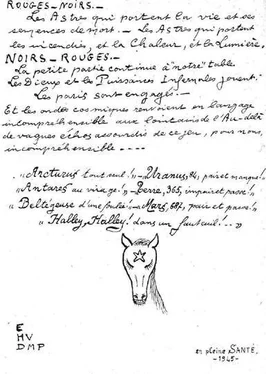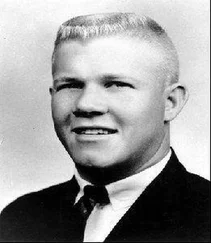“Since you do not appear to remember, the dossier is number 16582.”
The prosecutor scribbled the number down with a great flourish, hoping to show the jurors that he intended to disprove this allegation. The judge ordered that this file, completed in April 1945, be retrieved and brought to the courtroom. It would not have any bombshells. But for the moment, it seemed that Kahan was a Gestapo agent.
Marcel Petiot had been unusually quiet. The president asked if he had any questions. Yes, he did, the defendant said. After inquiring about the baggage carried by the Wolff and Basch families and inviting the witness to clarify her financial situation, Petiot seemed most interested in the claim by Cadoret about his dirty hands. Had Kahan also noticed that? he asked.
“I have not looked at your hands,” she said. “They did not interest me.”
Perhaps they were dirty, Petiot responded. When he visited Kahan on rue Pasquier, he told the court, he had not felt safe and often changed the manual gearshift on his bicycle in case he needed to make a fast escape. Many people in the audience found it amusing to hear France’s alleged most deadly serial killer claim that he did not feel safe on that particular street.
“If I did have dirty hands,” Petiot then shouted, “at least I never dirtied them by raising them to swear an oath of loyalty to the traitor Pétain!”
“I forbid you to be insolent,” Leser warned the defendant.
“Toward whom?” Petiot laughed. “Pétain?”
Leser reminded the court that magistrates had been required to swear oaths of allegiance to German authorities. The Act Constitutionel No. 9, drafted on April 4, 1941, made it law. Petiot said that he knew someone who had refused. Paul Didier was the most famous example of a judge who lost his position for his principled refusal.
Leser dismissed the witness. In the audience, Jean Galtier-Boissière found her intriguing and rather puzzling: “Was she tortured by remorse for having delivered three Jewish families who had confided in her to a killer?” Did she perhaps serve the Germans? After listening to her testimony the last two hours, Galtier-Boissière said that he still could not decide between “these equally plausible hypotheses.”
The prosecution closed by calling a number of other witnesses to show that the Wolffs, the Basches, and the Schonkers could not have worked for the Gestapo. Three hotelkeepers from the quartier Saint-Sulpice testified that each of the Jewish families had fled the Nazis into France and were trying to flee again. Petiot had posed as their unfortunate answer.
33.
WALKOUT
THE FOREIGN PRESS DOES NOT APPEAR TO UNDERSTAND FRENCH JUSTICE.
—Alex Ancel, Parisien Libéré , March 31, 1946
IN Floriot’s hands, the interrogation of witnesses on days eleven and twelve sometimes became so fierce that it seemed that the question of a witness’s or victim’s honor overshadowed the issue of Petiot’s guilt. The prosecution, outmaneuvered, labored to prove the obvious, namely, in Yvan Dreyfus’s case, that he was a patriot who had been forced to sign two documents promising to aid the Third Reich. The defense used the evidence of his signature to argue that Dreyfus was a collaborator and a traitor who intended to infiltrate Petiot’s Resistance organization.
After the radio engineer Jean-Claude Stern testified about Dreyfus’s patriotism, an electrician imprisoned with him at Compiègne named Marcel Berthet also confirmed Dreyfus’s Resistance credentials. “We respected Yvan Dreyfus as the most reliable Resistant, and I was keen to come here to declare it.” One highlight of his testimony was telling the court how Dreyfus and several other prisoners nearly succeeded in digging a tunnel to escape the camp.
Maître Véron then read a telegram from Pierre Mendès-France, a future prime minister who at that time served as Charles de Gaulle’s minister of national economy. After making a dramatic escape from a Vichy prison, Mendès-France joined the Free French forces in Britain. Mendès-France, then on a mission in New York, defended his fellow Resistant with passion. “I learn with amazement that PETIOT DARED DEFAME THE MEMORY OF YVAN DREYFUS.” The allegations were “unthinkable to everyone who valued Dreyfus’s character, courage, and patriotism.” Petiot looked on, several eyewitnesses noted, with an expression that vacillated between boredom and disdain.
Paulette Dreyfus then took the stand, wearing a black dress suit with a black veil and a pearl necklace. Unlike most of the previous witnesses, Dreyfus did not look at Petiot when she testified, and the physician, for once, did not interrupt.
Dreyfus discussed, her voice trembling, how her husband wanted to leave Occupied France to join de Gaulle in London. She told of his capture, imprisonment at Compiègne, and fear of deportation to Drancy, followed by the sordid history of the negotiations over his release that ended with Yvan being forced to sign the Gestapo papers. “I was horrified,” Dreyfus said. “His release was supposed to be unconditional.”
Dreyfus told how then, after they had paid the ransom, the lawyer Jean Guélin came with yet another “last requirement” for her husband at Gestapo headquarters. Her husband left with him and she never saw him again.
“When your husband left, did he carry any suitcases?”
“No, Guélin took care of the luggage and loaned him some,” Dreyfus said, thereby supporting the defense contention that the Gestapo attempted to infiltrate Petiot’s organization. Floriot had already established that the first of the two letters her husband had been forced to sign bound him not to act in any way against the Third Reich. He now asked her about the second letter. Dreyfus’s answer was exactly what the defense counsel wanted to hear: “To give information on the organization that managed the departures.”
LIKE Madame Dreyfus, Fernand Lavie had been outraged by Dr. Petiot’s assertion that he killed only “Germans, notorious collaborators, Gestapo, and agents provocateurs. ” His mother had been killed, he had earlier told the police, because she refused, “by her silence, or her declarations [to become] an accomplice of Dr. Petiot’s trafficking in drugs.” Lavie was the next witness called to the stand.
He retraced the background of the case from his half sister Raymonde Baudet’s arrest for forged prescriptions to the strange postcards allegedly from his mother informing the family of her sudden departure for the unoccupied zone. “My mother never intended to leave,” Lavie said, noting that she did not pack any personal belongings or take any money with her.
Floriot reminded the court that Khaït’s husband David told the police that he believed Marthe had both written and delivered the letters, admitting also that she had previously expressed an interest in fleeing Occupied Paris. David Khaït was not available to testify because he had been arrested and deported by the Germans in June 1944. He had not returned.
“Do you know,” Floriot then asked, “that three people, including a railroad employee, believed that they recognized your mother in June 1943?” This was fifteen months after her disappearance.
Lavie said he had not heard that.
“Didn’t your mother come to drop off a letter with your attorney as your stepfather claimed?” The maid at the attorney’s office had also recognized her, Floriot said. The attorney, of course, happened to be Véron, who was now serving as Lavie’s representation in the civil suit. If this statement was correct, Floriot had found four witnesses who claimed to see Khaït after the time his client was accused of killing her.
“Let’s call the maid to the stand,” Véron said. The irony of the lawyer questioning the statement of his own maid was not lost.
Читать дальше












